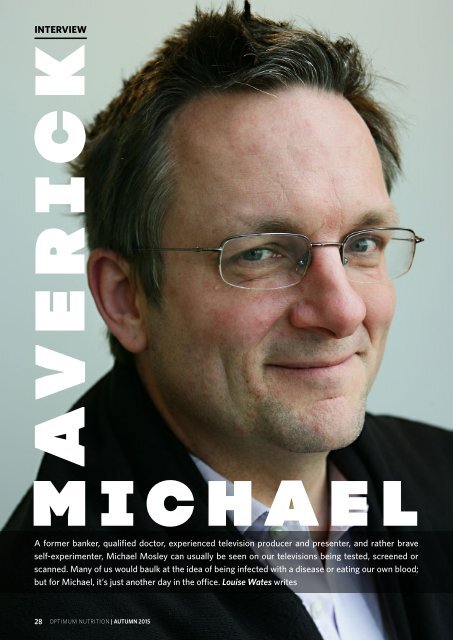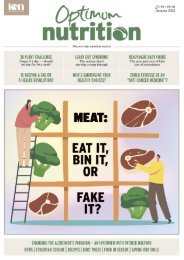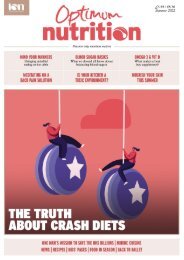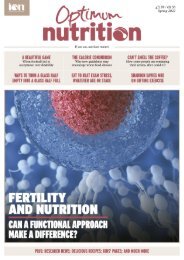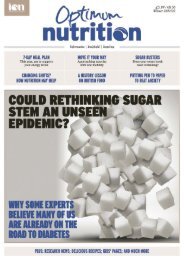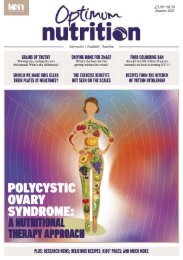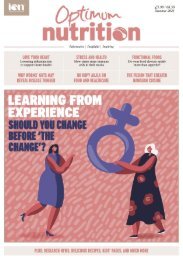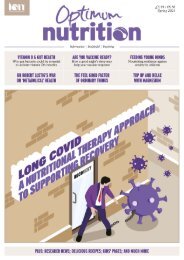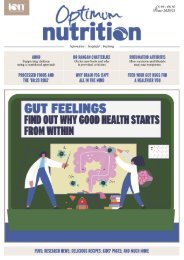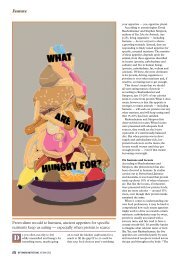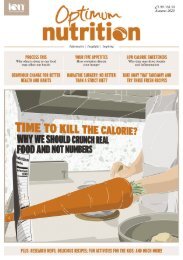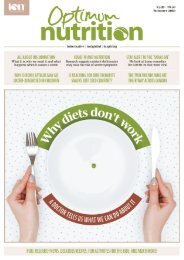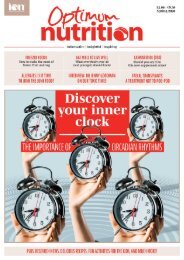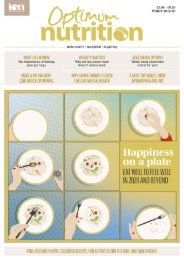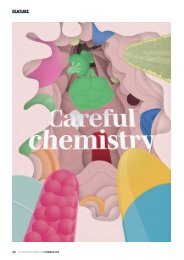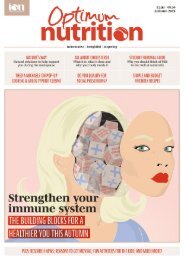Create successful ePaper yourself
Turn your PDF publications into a flip-book with our unique Google optimized e-Paper software.
INTERVIEW<br />
averick<br />
MICHAEL<br />
A former banker, qualified doctor, experienced television producer and presenter, and rather brave<br />
self-experimenter, <strong>Michael</strong> <strong>Mosley</strong> can usually be seen on our televisions being tested, screened or<br />
scanned. Many of us would baulk at the idea of being infected with a disease or eating our own blood;<br />
but for <strong>Michael</strong>, it’s just another day in the office. Louise Wates writes<br />
28 OPTIMUM NUTRITION | AUTUMN 2015
INTERVIEW<br />
Image: BBC/Ed Miller. Copyright BBC<br />
Doctor, television presenter and (I<br />
hope he will forgive the description)<br />
one-man lab rat, <strong>Michael</strong> <strong>Mosley</strong><br />
is an interesting man. Affable and with a<br />
mischievous smile, he is an unassuming<br />
kind of chap who is possibly recognised<br />
more for what he has done, rather than<br />
his name. He has been on our television<br />
screens for a decade, so I hope he won’t be<br />
offended that when (after our interview)<br />
I asked friends and acquaintances if they<br />
had heard of him, many shook their heads.<br />
But when I said “he’s the TV presenter<br />
who infected himself with a tape worm<br />
and made a black pudding out of his own<br />
blood” their faces lit up with recognition.<br />
It’s possibly because of this kind of<br />
recognition that The Guardian newspaper<br />
once referred to <strong>Michael</strong> as “Auntie’s stunt<br />
presenter”, an accolade which seems to<br />
amuse him, but with which he doesn’t quite<br />
agree. “I don’t really do stunts,” he says.<br />
“I mean on the whole I do these things<br />
because I think they’re tremendously<br />
interesting.”<br />
More recently, he<br />
even had plasma<br />
from his own blood<br />
injected back into<br />
his face<br />
Through the BBC’s Horizon<br />
documentaries, <strong>Michael</strong>’s body and brain<br />
have been put through diet, exercise,<br />
scans and infection. He has even had<br />
plasma from his own blood injected back<br />
into his face. But it’s not so unusual.<br />
Many scientists have experimented on<br />
themselves, or been experimented on.<br />
<strong>Michael</strong>’s own inspiration was Nobel<br />
laureate Barry Marshall, the Australian<br />
doctor who discovered that ulcers were<br />
caused by bacteria.<br />
<strong>Michael</strong> explains, “Barry was convinced<br />
that stomach ulcers are caused by a<br />
previously-unknown organism called<br />
Helicobacter pylori — couldn’t convince<br />
anyone else, so he swallowed it himself and<br />
induced gastritis. He treated himself with<br />
antibiotics and showed that basically you<br />
could cure yourself of ulcers, which were<br />
regarded as an incurable disease.”<br />
At the time, <strong>Michael</strong> was working<br />
behind the cameras — for 20 of his 30<br />
years at the BBC he was a producer<br />
and executive producer. But the Barry<br />
Marshall programme was the catalyst<br />
for him stepping in front of the cameras.<br />
“That got me really, really interested in<br />
self-experimentation in the first place,”<br />
he says. “I pitched the idea of doing the<br />
history of medicine told through selfexperimenters<br />
to the controller of every<br />
BBC channel for about 15 years. Eventually<br />
I got in front of the controller of BBC4<br />
and she said ‘you seem enthusiastic why<br />
don’t you do it’.” The result was Medical<br />
Mavericks, which aired in 2009.<br />
<strong>Michael</strong> laughs at being called a “stunt<br />
presenter”, but doesn’t entirely agree with<br />
it. “Generally there is a purpose,” he says.<br />
“The only reason I quibble with the word<br />
‘stunt’ is because I only do these things<br />
for a reason, whatever the reason may be.<br />
So when I was doing the 5:2 diet [during<br />
which people follow a low-calorie diet for<br />
two days in the week ] I put myself on a<br />
kind of fasting, but there was a purpose<br />
to it — I was genuinely curious and I’d just<br />
discovered that I was a diabetic so I wanted<br />
to do something about it.”<br />
But what about making the black<br />
pudding from his own blood? Was there a<br />
reason for that?<br />
“I concede that one,” he laughs. “The<br />
rationale for that was a bit thinner than<br />
most. We debated that one. In the end I<br />
think probably that one was down more to<br />
curiosity than anything else.” He pauses for<br />
thought. “Ah... yup... no, the producer was<br />
very keen on it.” The argument for doing<br />
it, he explains, was that it demonstrated<br />
the nutritional qualities of blood. “I went<br />
‘hmmm... not sure’,” he says. “In the end it<br />
was kind of curiosity rather than any higher<br />
purpose, I must admit.”<br />
When I confess that the black pudding<br />
story put me off watching the whole series<br />
about blood, he says he’ll tell his producer.<br />
“We had a lot of debate about it because<br />
I thought it was a bit gruesome and I<br />
thought it was a bit... er... it was a little...<br />
you know. It wasn’t my finest moment but<br />
it was certainly an experience.” He says he<br />
had felt “absolutely fine” about eating the<br />
black pudding.<br />
“It was just like black pudding,” he says,<br />
“just a little less salty than your average<br />
black pudding. It was a curious thing to do<br />
— but not a terribly elevated thing to do.”<br />
Perhaps, surprisingly, there is a limit to<br />
what <strong>Michael</strong> is prepared to do in the name<br />
of science — or in the name of curiosity.<br />
“My wife is a GP and she debates these<br />
things with me, [whether] they have a<br />
sense of purpose, [or] are they likely to be<br />
dangerous. I said yes to tapeworm but only<br />
to beef tapeworm as they are harmless —<br />
the pork tapeworm is quite dangerous.”<br />
His own tapeworm infection was part of a<br />
wider study. “You go into a village in Africa<br />
you don’t know who’s got hookworm,<br />
tapeworm, whatever it may be, and so they<br />
wanted healthy volunteers. When I was<br />
infected I was also collecting stool samples<br />
and sending them off to Liverpool.<br />
“I wouldn’t have done hookworm<br />
because there wasn’t a particular project<br />
it was allied to, and hookworm is fairly<br />
unpleasant.”<br />
<strong>Michael</strong> also discusses his projects with<br />
his children. Undergoing genetic screening,<br />
for instance, could flag up conditions that<br />
might potentially affect them, and so he<br />
makes sure that his children would want to<br />
know. So far, they do.<br />
In the long-term, self-experimentation<br />
has seen him make changes to his lifestyle.<br />
After trying the 5:2 diet he now advocates<br />
it as The Fast Diet through a website and<br />
book of the same name; although he says<br />
that it may not suit everybody.<br />
“I’ve always said I don’t recommend it<br />
to children, to pregnant mothers, to people<br />
who want to get pregnant or to people who<br />
have a history of food issues. Beyond that<br />
I’m sure it’s not going to suit everyone.<br />
Some people try it and it doesn’t suit them<br />
at all. I think that’s true for any form of<br />
diet.”<br />
If you can stick to any diet, he says,<br />
you will probably lose weight. “But I<br />
think there are additional benefits which<br />
come from intermittent fasting which go<br />
beyond simply weight loss — but I think<br />
there are some people who just find it<br />
psychologically difficult.” He adds that<br />
trials are ongoing, studying who will stick to<br />
the diet and who won’t.<br />
Recently, a three-part Horizon special<br />
What’s the right diet for you? looked at<br />
whether overweight people fell into one of<br />
three groups: feasters, constant cravers or<br />
emotional eaters. After taking the online<br />
quiz, <strong>Michael</strong> found that he was a constant<br />
craver. But he doesn’t seem surprised. “I<br />
have a tendency to go around and munch<br />
things if I see them,” he says. “So in my<br />
house we tend to ban them all because if<br />
there’s chocolate lying out on the surface<br />
I will eat it. If there’s cake lying out on the<br />
surface I will eat it.”<br />
It’s surprising, considering his knowledge<br />
and borderline risk of diabetes. “That’s<br />
why these things are almost never about<br />
knowledge,” he says. “I’m constantly<br />
tempted — particularly by sugary things,<br />
despite everything I know.<br />
“My daughter has now forgiven me for<br />
eating her Easter egg once when I came<br />
across it. She was eight or something<br />
like that — she’s 15 now but she still<br />
remembers it and reminds me of it.”<br />
Creating circumstances in which you are<br />
less likely to be tempted will help, he says.<br />
AUTUMN 2015 | OPTIMUM NUTRITION<br />
29
INTERVIEW<br />
“There’s quite a lot of evidence that the<br />
stuff you see is the stuff you will eat.” But<br />
willpower “is grossly overrated” he adds. “I<br />
have a range of strategies of which one is<br />
simply to not have it in the house. I adore<br />
chocolate — I have a very sweet tooth.”<br />
The Fast Diet, however, does mean<br />
eating less food for two days of the week.<br />
If <strong>Michael</strong> is a constant craver who will<br />
munch his way through whatever treats fall<br />
in his path (regardless of ownership!) how<br />
does he manage? Here, a certain amount of<br />
will power does come into play, although he<br />
believes it is made easier when you know<br />
you are not actually depriving yourself.<br />
“You can exert the willpower to go, ‘Not<br />
today. Today I’m not eating any of these<br />
things, I don’t care. I won’t have the pizza,<br />
I won’t have the chocolate, but I’ll have it<br />
tomorrow.’ And then tomorrow comes and<br />
maybe you do but maybe you don’t. If you<br />
say ‘I’m never going to eat chocolate again’,<br />
then you kind of give up and scoff the<br />
chocolate bar in front of you. If you think ‘I<br />
can have it tomorrow’ generally speaking I<br />
can exert enough willpower.”<br />
An advantage to the 5:2 diet, he says,<br />
is that by becoming truly hungry and then<br />
eating vegetables, we can educate our<br />
taste buds to enjoy healthier food. “There<br />
are physiological advantages, psychological<br />
advantages,” he says, “but also the fact<br />
that if you eat healthier foods when you get<br />
hungry I think it retrains your palate.” In the<br />
past he would advise others to eat more<br />
vegetables even though he didn’t do so<br />
himself. “But these days I do ‘cause when<br />
I get hungry I eat vegetables, and I find I<br />
actually enjoy them.”<br />
Yet despite his knowledge and his more<br />
educated palate, <strong>Michael</strong> says he would<br />
still give in to unhealthy foods. Even bacon,<br />
which has been said to knock minutes off<br />
one’s life, is something in which he will still<br />
indulge, although these days not very often.<br />
“How long does it take off your life?” I<br />
ask.<br />
“About half an hour, I think,” he laughs.<br />
“But alternatively if you go for a run that’s<br />
going to add about half an hour to your life,<br />
so you can kind of compensate to some<br />
extent.” On the occasions he does eat<br />
bacon, he appreciates it. “I’m conscious<br />
that if I’m going to eat it I may as well<br />
enjoy it.” His children love bacon too, he<br />
says, but aren’t worried about long-term<br />
implications. “They’re not persuaded by<br />
the knocking half an hour off your life —<br />
they don’t care at this age.” But they have<br />
adapted to a household ban on fizzy drinks<br />
and most fruit juices.<br />
Because science is increasingly able to<br />
probe more intricately into human biology,<br />
diet isn’t as straightforward as it was once<br />
thought to be, and because of this <strong>Michael</strong><br />
believes people shouldn’t be afraid to<br />
experiment. “Our problem is that as we<br />
get a better understanding we realise the<br />
world is much, much more complicated; so<br />
it’s no longer simply saturated fats — it’s<br />
also down to the type of fats. You can also<br />
throw in the fact that genetics makes it<br />
much more complicated.” Because of this,<br />
he is “a great fan” of self-experimentation.<br />
“I think people should experiment with<br />
themselves,” he says. “There is an<br />
advantage to being a bit mindful, to trying<br />
different foods, seeing what effect they<br />
have on you, but also whether you enjoy<br />
them.”<br />
Ultimately, though, he believes that<br />
getting away from processed foods is<br />
important. “I’m a great believer on the<br />
whole that at its core, there is a simple<br />
message that processed foods are<br />
generally bad. The more processed they<br />
are, the worse they are for you, and the<br />
closer you can get to the real food the<br />
better. But it’s also difficult because<br />
processed foods tend to be, by their very<br />
nature, tasty.<br />
“We have this idea it’s fat, it’s sugar,<br />
but the reality is most of us don’t fill our<br />
faces with a bowl of sugar, we don’t drink a<br />
pint of cream — but if you put them in the<br />
freezer and mix them up we have ice cream<br />
and, blimey, we love ice cream!”<br />
<strong>Michael</strong>’s new series ‘The Extraordinary<br />
Making Of You’, produced in partnership<br />
with the Open University aired on BBC2<br />
in September. Check the BBC iPlayer for<br />
availability.<br />
30 OPTIMUM NUTRITION | AUTUMN 2015
Enjoyed reading this<br />
preview?<br />
Subscribe and read the full digital magazine for FREE.<br />
Subscribe


